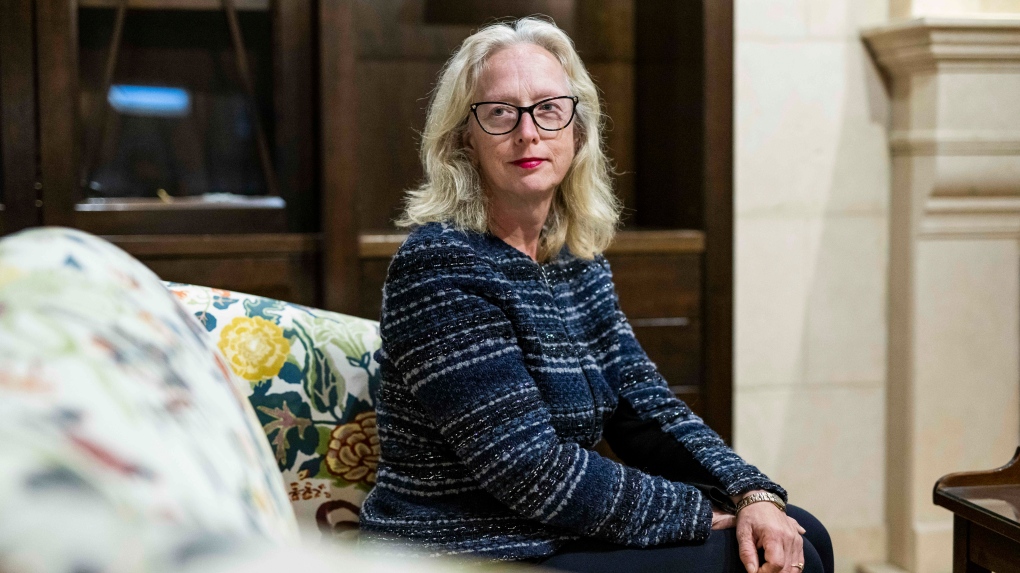風蕭蕭_Frank
以文會友加拿大駐華大使:中國不是“對手”,中加關係複雜、多麵且非常重要
 齊倩郵箱:qiqian@guancha.cn 2023-06-19 觀察者網
齊倩郵箱:qiqian@guancha.cn 2023-06-19 觀察者網
(觀察者網訊)近幾個月以來,加拿大方麵不僅在貿易和“間諜氣球”事件上緊跟美國,還不斷炒作所謂“中國幹預選舉”話題,造成中加關係緊張。但加拿大駐華大使梅倩琳(Jennifer May)在接受加拿大電視台(CTV)采訪時稱,中國並不是加拿大的“對手”,而是一個“複雜的合作夥伴”,中加關係“非常重要”。該采訪於當地時間6月18日播出。

梅倩琳在節目中告訴主持人,加拿大和中國有著“複雜”、“多麵”和“非常重要”的關係。她認為,處理兩國關係時,重要的是要關注雙方的共同目標,比如氣候變化和環境、貿易和投資。
當被問及是否會將中加關係描述為“敵對關係”時,梅倩琳回答:“不會(would not)”。她表示:“我認為中國是一個複雜的合作夥伴。在某些領域,他們是合作夥伴;在另一些領域,他們更像是競爭對手。但我不認為我們可以用一兩個詞語總結中國這樣一個大而複雜的國家或中加關係。”
她認為,中加兩國之間保持開放性對話很重要,加拿大外長同中方的對話是開放的。但她沒有透露加拿大是否正在計劃對中國進行高層訪問。
梅倩琳還談到了台海問題,聲稱加拿大應在麵對中方“激進行為”時“不退縮”。但被問及加拿大是否應以牙還牙時,她補充說,重點應該是采取“堅定有力的行動,而不一定是咄咄逼人的行動”。
值得一提的是,梅倩琳在采訪中重提所謂的“中國幹預選舉”話題。
據梅倩琳聲稱,加拿大處理對華議題時,“應堅決、強烈和明確地反擊,就像我們對外國幹涉所做的那樣。但也需在氣候變化和環境等全球問題上伸出援手”。她還說,她已經向中方提出了“幹預選舉”的話題,明確表示這是“不可接受的行為”。
在提及加拿大駐上海總領館領事甄逸慧被中方要求限期離境時,梅倩琳開始倒打一耙,用“不幸”一詞形容該事件。她同時表示:“雖然中方有權這麽做,但我希望中方沒有采取措施,關閉我們通過外交官進行對話的主要渠道之一。”

加拿大駐華大使梅倩琳接受采訪,視頻截圖
近一段時間,加拿大媒體和多名政客不斷炒作所謂“中國幹預選舉”話題。
此前,加拿大媒體《環球郵報》與《環球新聞》援引加拿大國家安全機構泄露的消息,聲稱中方暗中幹預了加拿大2019年和2021年的聯邦選舉,致使特魯多被反對黨政客不斷要求“對中方作出回應”。在保守黨的壓力下,特魯多3月任命獨立特別調查員大衛·約翰斯頓展開調查。
除任命特別調查員外,5月8日,加方還公然宣布中國駐多倫多總領館一名領事官員為“不受歡迎的人”。據中國外交部網站消息,5月9日,中方決定采取對等反製措施,將加拿大駐上海總領館領事甄逸慧列為“不受歡迎的人”,已要求其5月13日前離華。中方保留作出進一步反應的權利。
中國駐加拿大大使叢培武5月19日接受彭博社采訪時,奉勸加方不要作出進一步挑釁行為,並表示加拿大應該回歸更加獨立的外交政策,而不是跟隨美國的腳步。
5月24日,我外交部發言人毛寧在例行記者會表示,我們已多次強調,中方一貫奉行不幹涉別國內政的外交政策,也堅決反對任何國家幹涉其他國家的內政。我們沒有興趣,也不會幹預加拿大的內政和大選。我們奉勸加方摒棄意識形態偏見和冷戰思維,不要總拿中國說事。
China not an adversary to Canada, despite 'complicated' relationship: ambassador
Spencer Van Dyk CTV News Parliamentary Bureau Writer,
Canada’s ambassador to China insists the two countries are not adversaries, despite mounting examples of tense relations and allegations of foreign interference stacking up in recent months.
Jennifer May told CTV’s Question Period host Vassy Kapelos, in an interview airing Sunday, Canada and China have a “complex,” “multifaceted,” and “very important” relationship, but that it’s important to focus on the goals they have in common, such as climate change and the environment, trade and investment.
There have been a series of incidents in recent months that have put the two countries at odds, however: a tense conversation between Prime Minister Justin Trudeau and President Xi Jinping at the G20 summit last fall, multiple allegations of China interfering in Canadian elections, an alleged Chinese spy balloon flying over Canada and the United States, and Canada’s expulsion of a Chinese diplomat following allegations he targeted Conservative MP Michael Chong and his family.
But when asked whether she would describe the relationship between Canada and China as adversarial, May said she “would not.”
“I would describe China as a complex and complicated partner to work with,” she said. “And in some areas, they are a partner, but in others, they are more of a competitor.”
“But I don't think we can take a big complicated country or relationship like China, and put it down into one or two words,” she added.
May also said it’s important to keep the dialogue open.
“It means absolutely pushing back very firmly, strongly and clearly, as we've done on foreign interference, but also where there is an extended hand on issues that are absolutely existential for the entire globe, like climate change and the environment, that we don't throw that baby out with the bathwater,” she said.
The ambassador also said she’s raised the issue of foreign interference with senior levels of China’s foreign ministry to make it clear it is “not acceptable behaviour.”
May said China expelling Shanghai-based Canadian diplomat Jennifer Lynn Lalonde — a reciprocal move following Canada’s expulsion of Chinese diplomat Zhao Wei — was “unfortunate,” but “could have been worse.”
“That was very difficult,” she said. “My colleague had to leave on very short notice with her family. So yeah, that has had an impact on us very directly on the ground as well.”
“I wish that they had not taken the step of closing down essentially one of our channels of dialogue through our diplomat, but it is their right to do so,” she also said.
Relations between China and Canada’s closest ally, the United States, have also been strained. U.S. National Security Council spokesperson John Kirby told Kapelos earlier this month China’s recent actions in the Taiwan Straight are increasingly “aggressive.”
“I think we are seeing them taking aggressive actions for sure,” May said. “We see them as disrupting, trying to play with the rules around the margins, around the game.”
“But I think that's where we also are stepping up with confidence and making sure that that we're not backing down in the face of that kind of change to the normal status quo,” she added.
But when asked whether Canada should respond in kind, May said the focus should instead be on acting “determined and forceful, rather than necessarily aggressive.”
American officials meanwhile very recently have said they want to reset the relationship through diplomacy.
In that vein, U.S. Secretary of State Antony Blinken is set to visit Beijing on Sunday, after a trip in February was postponed due to the Chinese balloon incident.
May said the lines of dialogue are open between Canadian Foreign Affairs Minister Melanie Joly and her counterpart in China, but wouldn’t say whether plans for a high level Canadian visit to China is in the works.

Jennifer May, Canada's Ambassador to China, is shown in Ottawa, on Wednesday, Sept. 28, 2022. THE CANADIAN PRESS/Justin Tang




